School Covid catch-up funding so bureaucratic - Luton trust
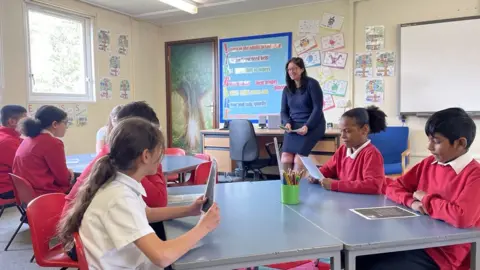 BBC/Ben Schofield
BBC/Ben SchofieldTwo years after the UK went into its first lockdown, schools are still trying to help pupils who fell behind during periods of home-learning. Some schools feel accessing "catch-up" funding has been a problem.

'Difficult, lengthy and slow'
Cori Bateman is chief executive officer of the Pioneer Learning Trust which manages three Luton primary schools.
"Significant amounts of catch-up is needed," according to Ms Bateman, who says their children have "really fallen behind" in mathematics and writing.
"We've got reading-based curriculums so reading has been quite well sustained" among pupils, says Ms Bateman.
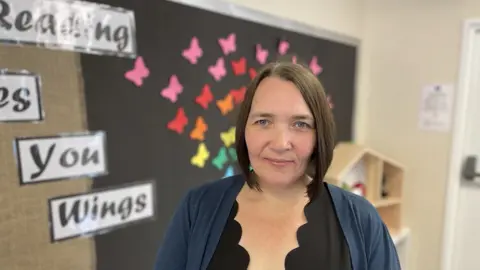 BBC/Ben Schofield
BBC/Ben SchofieldThe impact of lockdown learning was found to be worse among disadvantaged children across the country.
Ms Bateman says: "The online learning has been difficult to access, and they haven't had access to the support they were getting [previously] in schools.
"Our disadvantaged children...have fallen further behind."
The trust says it has been able to access government funding including money from the National Tutoring Programme to help pupils catch-up with their learning.
But she says the bureaucracy involved is "difficult... lengthy and slow".
"We've accessed an academic mentor, but have only been able to find one for three schools.
"The system for school-led tutoring is so bureaucratic and it's quite difficult to navigate.
"I don't believe there are many schools that are accessing everything [they are entitled to]".
Ms Bateman says they are also dealing with more early-years children with speech and language difficulties.
She says these children can have difficulties verbalising their needs and many have separation issues or anxiety.
She says in one class, 30% of early-years children have been identified with difficulties, and "that's something we don't have additional money for".
Prior to the pandemic about 10% of the trust's children struggled with speech and language issues.
She says the lockdowns led to many services for younger children closing, such as toddler and baby massage groups, with some only recently reopening.
Ms Bateman says all current funding was aimed at catch-up programmes for older children to help get them ready for exams and statutory tests.

'Still challenging'
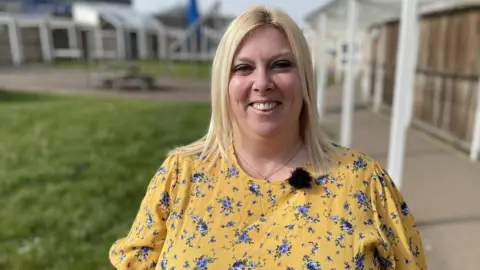 BBC/Ben Schofield
BBC/Ben SchofieldSarah Baldwin is head teacher of Southfield Primary, one of the Luton trust's schools.
She says the catch-up challenge extends beyond helping pupils with their academic performance.
"It's not just in terms of their maths and English skills which are really important, but coming back into the classroom, being aware of what those classroom rules are again, and how they interact with their friends," says Ms Baldwin.
"All of that has to happen first before you can even tackle their maths and English skills."
She adds that the prevalence of Covid among staff and a lack of supply teachers has "been tough and it's definitely still challenging".

'Practical learning lost'
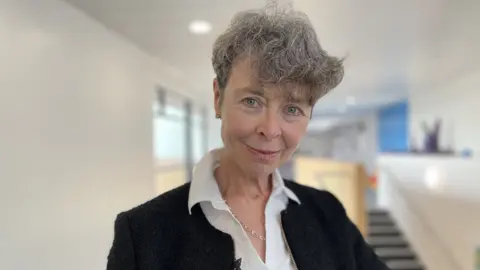 BBC/Ben Schofield
BBC/Ben SchofieldClaire Coates, principal of Cambourne Village College in Cambridgeshire, says because pupils had tablets during lockdowns, they were "perhaps less impacted overall" than pupils at other schools.
She says "what could be taught online was very different to what could be taught in the classroom".
"There has been a huge amount of practical learning lost," says Ms Coates.
"Now that we're back in school practical work in science, design and technology, music, art and drama are being prioritised."
She says there's also been emphasis on "reading-recovery lost during lockdown".
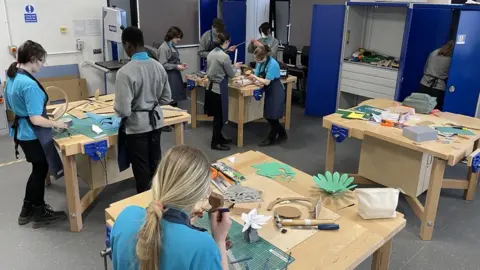 BBC/Ben Schofield
BBC/Ben SchofieldMs Coates says: "We're beginning to recover all of the enjoyable parts - the extra-curricular activity, the sports, the outings.
"We've got our first school production for three years coming up in June and we're very excited about that.
"But we're still hit by very significant staff absence. We're having a resurgence in sickness - Covid and other seasonal illnesses."
Cambridgeshire saw a spike in Covid cases last week.
The school says it had to send seven classes home last week as 10 members of staff were off due to Covid.
"So yes, it's become a real challenge again," says Ms Coates.

A Department for Education spokesperson says it is investing £5bn in "high-quality tutoring, world-class training for teachers and early-years practitioners, additional funding for schools, and extending time in colleges by 40 hours a year".
"We're supporting the most disadvantaged, vulnerable or those with the least time left in education - wherever they live - to make up for learning lost during the pandemic."

Find BBC News: East of England on Facebook, Instagram and Twitter. If you have a story suggestion email [email protected]
